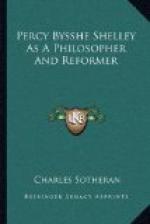The Immortality of the Soul has ever been a subject of primary importance to all philosophers—the last dying efforts of Socrates, noblest of Greece’s sons, as Plato has shown us in the Phaedo, were expended in a discussion on the pros and cons of an argument in favor of a future life. Many of the highest intelligences since his day have been endeavoring to prove this satisfactorily without the aid of theological revelation. All mankind, from sage to peasant, from the most learned Brahmin on the banks of the Ganges to the untutored red Indian beside the Mississippi, has the question, “is there an existence after death,” been approached with the most earnest hopes to solve as one of the greatest mysteries. Shelley devoted a vast amount of energy to the elucidation of this occult, yet overt, truth; and in one place remarks:
“The desire to be forever as we are; the reluctance to a violent and unexperienced change, which is common to all; the animate and inanimate combinations of the universe, is, indeed, the secret persuasion which has (among other reasons) given birth to a belief in a future state.”
Full well he knew, that independent of matter, there was a power, which has been denominated by some, Spirit; by others, simply mind, force, or intelligence; and by metaphysical philosophers, soul. If he approached the subject logically, as in his essay, “On a Future State,” the ignis fatuus seems to escape him and be lost; if poetically, with the innate voice which speaks within us all, ever present.
After close reasoning in the essay I have referred to, he arrived at the conclusion that even
“if it be proved
that the world is ruled by a divine power,
no inference can necessarily
be drawn from that circumstance
in favor of a future
state.”
and that
“if a future state
be clearly proved, does it follow that it
will be a state of punishment
or reward?”
Then in extension of the same argument he urges:
“Sleep suspends many of the faculties of the vital and intellectual principle—drunkenness and disease will either temporarily or permanently derange them. Madness, or idiotcy, may utterly extinguish the most excellent and delicate of these powers. In old age the mind gradually withers; and as it grew and strengthened with the body, so does it with the body sink into decrepitude.”
He also considered that:




